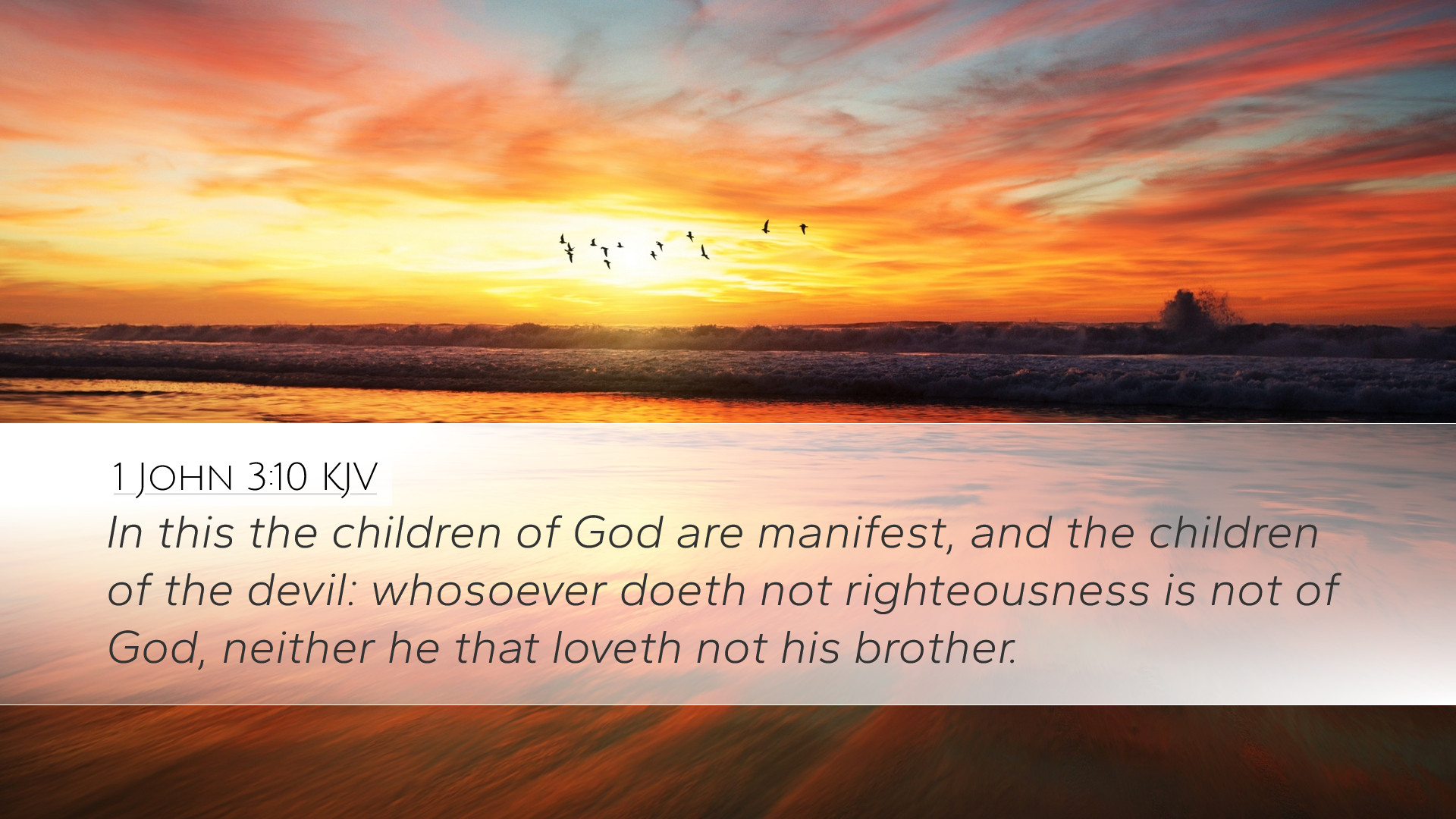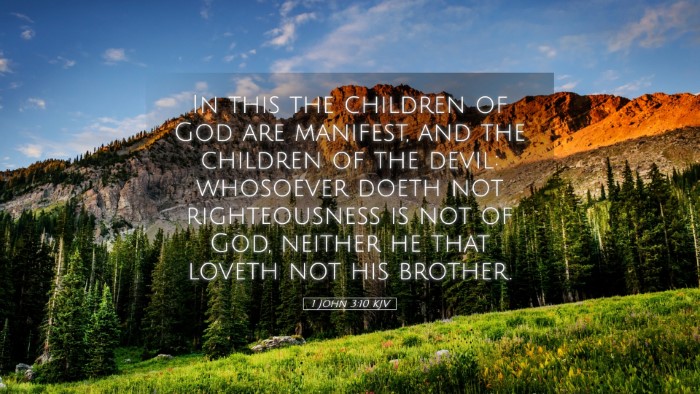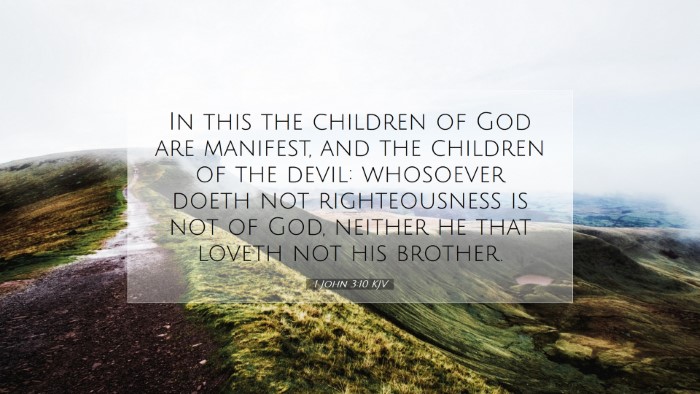Old Testament
Genesis Exodus Leviticus Numbers Deuteronomy Joshua Judges Ruth 1 Samuel 2 Samuel 1 Kings 2 Kings 1 Chronicles 2 Chronicles Ezra Nehemiah Esther Job Psalms Proverbs Ecclesiastes Song of Solomon Isaiah Jeremiah Lamentations Ezekiel Daniel Hosea Joel Amos Obadiah Jonah Micah Nahum Habakkuk Zephaniah Haggai Zechariah Malachi1 John 3:10
1 John 3:10 KJV
In this the children of God are manifest, and the children of the devil: whosoever doeth not righteousness is not of God, neither he that loveth not his brother.
1 John 3:10 Bible Commentary
Commentary on 1 John 3:10
Verse: "In this the children of God are manifest, and the children of the devil: whosoever doeth not righteousness is not of God, neither he that loveth not his brother."
Introduction
This verse serves as a critical marker in John's epistle, distinguishing the children of God from the children of the devil. Through the lens of holiness and love, John articulates a defining characteristic of true believers.
Exegesis of the Verse
The structure of the verse implies a juxtaposition between those who are in a right relationship with God and those who are not. John presents not only a theological statement but a moral one, making righteousness and love foundational to identifying true followers of Christ.
Children of God vs. Children of the Devil
1. Identification of God's Children: According to Matthew Henry, the manifestation of God's children is based on their fruits. The authenticity of their faith is observable through their actions—"they doeth righteousness." God’s children display a righteous life, reflecting His character.
2. Identification of the Devil's Children: In contrast, those who do not practice righteousness fall under the influence of the devil. Albert Barnes notes that living in a state of sin, without repentance, exemplifies an alignment with the devil's nature. The absence of righteousness serves as a clear delineation between God's children and those who oppose His ways.
Righteousness and Love
The phrase "doeth not righteousness" signifies a lifestyle choice, not merely isolated actions. Adam Clarke emphasizes that righteousness is persistent and includes a commitment to God's commands. Love, as John later elaborates in his letters, is intertwined with righteousness and is a non-negotiable trait of genuine believers.
- Righteousness: The ethical aspect of faith, representing a moral obligation to live aligned with God's laws.
- Love: A practical outworking of one’s faith; John emphasizes this connection throughout the entirety of his epistle, reinforcing that loving one’s brother is a foundational aspect of a believer's identity.
Theological Implications
This verse confronts the reader with serious introspection regarding their relationship with God. The absence of righteousness and love raises profound questions about one's spiritual status. The implications are clear for both personal faith assessments and communal examination within the body of Christ.
Righteousness as Evidence of Salvation
Barnes points out that a marked life of righteousness serves as evidence of salvation. Genuine faith naturally produces good works; thus, lack of such works may indicate a need for spiritual revival or reassessment of one's faith.
The Necessity of Love Among Believers
The latter part of the verse emphasizes love towards a brother as a crucial aspect of being a child of God. Clarke expounds that love is not just an emotional response but is manifested through actions and attitudes that reflect Christ's love for humanity.
Practical Applications
For believers, this verse serves as a dual-edged sword, offering both comfort and challenge. Here are some practical implications of 1 John 3:10 that can guide pastors, students, theologians, and scholars:
- Self-Examination: Encourage a regular practice of self-assessment—apart from righteousness and love, where does one stand in terms of faith?
- Community Engagement: Foster a culture within the church wherein love is demonstrated through tangible acts, promoting unity and accountability among members.
- Teaching Righteousness: Preach the importance of a moral life that aligns with God's Word. Emphasize that righteousness is not optional but rather an essential aspect of spiritual living.
- Facilitating Forgiveness: In instances where love is lacking, encourage reconciliation and forgiveness as hallmarks of a Christ-centric community.
- Reflect on the Nature of God: Consider how God’s righteous character informs our own righteousness and calls us into deeper relationship with Him.
Conclusion
1 John 3:10 serves as a poignant reminder of the fundamental characteristics of a child of God: righteousness and love. It challenges believers not only to assess their spiritual status but also to grow in their expressions of love and moral integrity, ensuring their lives reflect the nature of their Father in heaven.


